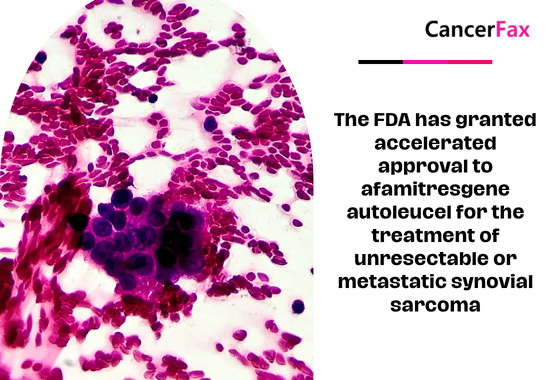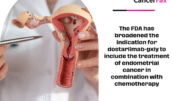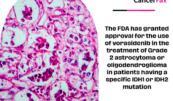August 2024: The Food and Drug Administration has given accelerated approval to afamitresgene autoleucel (TECELRA, Adaptimmune, LLC), a genetically modified autologous T cell immunotherapy that targets the melanoma-associated antigen A4 (MAGE-A4). This approval is specifically for adults with unresectable or metastatic synovial sarcoma who have previously undergone chemotherapy, are positive for HLA-A*02:01P, -A*02:02P, -A*02:03P, or -A*02:06P, and have tumors that express the MAGE-A4 antigen as confirmed by FDA-approved or cleared companion diagnostic devices.
The effectiveness of the treatment was assessed in a clinical trial called SPEARHEAD-1, Cohort 1. This trial included patients with inoperable or metastatic synovial sarcoma who had previously received doxorubicin and/or ifosfamide as systemic therapy. The patients in the trial had the HLA-A*02:01–03 and 06 alleles, and their tumors expressed the MAGE-A4 tumor antigen. The trial was multicenter, single-arm, and open-label. Patients were administered a lymphodepleting treatment consisting of fludarabine and cyclophosphamide.
A total of fifty-two patients diagnosed with synovial sarcoma were included in the study and underwent leukapheresis. However, eight of these patients were unable to receive afamitresgene autoleucel for various reasons, including death (n=3), loss of eligibility before lymphodepleting chemotherapy (n=3), patient withdrawal (n=1), and investigator decision (n=1). A total of 45 individuals underwent lymphodepletion, however, one patient decided not to proceed with the treatment, resulting in 44 patients who received a single infusion of afamitresgene autoleucel.
The primary measure of effectiveness was the overall response rate (ORR) as determined by independent evaluation using RECIST v1.1 criteria, with additional consideration given to the duration of response (DOR). The observed response rate (ORR) was 43.2% with a 95% confidence interval (CI) ranging from 28.4% to 59.0%.
The median response time was 4.9 weeks, with a 95% confidence interval ranging from 4.4 weeks to 8 weeks. The median duration of response (DOR) was 6 months, with a 95% confidence interval (CI) ranging from 4.6 months to not attained. Of the patients that positively responded to the medication, 45.6% and 39.0% experienced a response duration of at least 6 months and 12 months, respectively.
The prescribing material contains a boxed warning regarding the occurrence of cytokine release syndrome (CRS), which can be severe or life-threatening, and may result in death.
The predominant nonlaboratory adverse events, occurring in at least 20% of cases, included cytokine release syndrome, nausea, vomiting, exhaustion, infections, pyrexia, constipation, dyspnea, abdominal pain, non-cardiac chest pain, decreased appetite, tachycardia, back pain, hypotension, diarrhea, and edema. The most prevalent laboratory abnormalities in grade 3 or 4 were decreased lymphocyte count, decreased neutrophil count, decreased white blood cell count, decreased red blood cell count, and decreased platelet count, each occurring in at least 20% of cases.
The suggested dosage for afamitresgene autoleucel ranges from 2.68 x 109 to 10 x 109 MAGE-A4 T cell receptor (TCR) positive T cells, which can be delivered in one or many infusion bags. Avoid the utilization of a leukodepleting filter or the administration of prophylactic systemic corticosteroids.
This application has been granted approval using the fast approval procedure. In order to confirm the therapeutic advantages of afamitresgene autoleucel, the FDA and the sponsor have reached an agreement to conduct a postmarketing study. This study will focus on adults who have unresectable or metastatic synovial sarcoma, have previously undergone chemotherapy, and have tested positive for HLA-A*02:01P, -A*02:02P, -A*02:03P, or -A*02:06P. Additionally, the participants’ tumors must express the MAGE-A4 antigen.






Afamitresgene autoleucel FDA approval, FDA accelerated approval cancer drugs, Metastatic sarcoma therapy, Sarcoma breakthrough treatment, SPEAR T-cell technology, Synovial sarcoma immunotherapy, T-cell therapy for sarcoma, Unresectable sarcoma treatment
CancerFax is the most trusted online platform dedicated to connecting individuals facing advanced-stage cancer with groundbreaking cell therapies.
Send your medical reports and get a free analysis.
🌟 Join us in the fight against cancer! 🌟
Привет,
CancerFax — это самая надежная онлайн-платформа, призванная предоставить людям, столкнувшимся с раком на поздних стадиях, доступ к революционным клеточным методам лечения.
Отправьте свои медицинские заключения и получите бесплатный анализ.
🌟 Присоединяйтесь к нам в борьбе с раком! 🌟